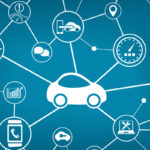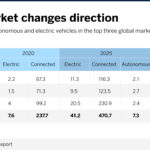Payments, the latest accessory for connected cars
In a few years, we may not be paying with cash, cards or even with smartphones, but rather, by car. Vehicle connectivity will change the way we manage time and money, but a number of problems still need to be addressed.

There are currently about 100 million connected vehicles around the world, and this is just the beginning. The growth forecasts are spectacular: PwC is predicting that this number will reach 470 million in 2025; Business Insider Intelligence believes it will be 293 million by that time, while the consulting firm Gartner estimates that there will be 250 million connected cars in just two years.
Furthermore, what we know as automobile connectivity today will seem like child’s play in a couple of decades. Currently, it consists of little more than basic services related to road safety. But in a few years, cars will truly be autonomous – and by definition, hyper connected.
Cars will become a sort of giant smartphone where users can consume and share digital and audiovisual content, and also buy almost anything, just as consumers do today with their smartphones.
This will present a wide range of possibilities for different business areas. For example, marketing departments will find they have a new communication channel with a “semi-captive” audience, such as subway or airline passengers. And users of chat and social network applications will be even more connected.

But a recent Business Insider Intelligence report puts the focus on the unexploited opportunity inherent to connected vehicles: payments.
This enormous, latent business opportunity stems from two main factors. First, the average citizen, especially in the United States, spends a great deal of time in their car (in the U.S. 1.1 million trips are made by car every day, an average of four trips per U.S. citizen per day). Second, there are several purchases that are closely related to car travel – from gasoline, tolls and parking to cleaning products and food that can be picked up in the supermarket on the way home.
Already, several pioneering companies are taking advantage of this new way of doing business. In the United Kingdom, Jaguar drivers can get gas without leaving the car, thanks to Apple Pay and PayPal. And Visa and Honda are experimenting with a connected car that allows for in-car payments for gasoline and parking.
Bumps in the road
But the Business Insider Intelligence report also raises questions about the large-scale implantation of connected vehicles. Their moderate skepticism is based on the mobile payment experience and on questions about security.
Despite the push from two companies as powerful as Apple and Samsung, only one out of every four potential users actually make payments with their cell phones. The problem seems to be rooted in the fact that users do not see the benefit of paying with their phones. In fact, according to the BI report, 74% of U.S. adults say they would not pay by cell phone, no matter how many technical improvements are added to this service.
The other problem is security, as “hackers tend to massively attack the newest and weakest technologies,” BI Intelligence says. While these stumbling blocks are addressed, disruption in the automobile industry is moving ahead in all areas.
For example, IBM is working on using artificial intelligence in automobiles through its Watson computer system, in order to become more familiar with the drivers, their habits and their needs. IBM just took a big step forward by partnering with BMW and its recently launched open-source data platform, BMW Car Data.
Blockchain technology will also play a role - for example, in the used car market. Blockchain makes it possible to trace how a car has been used, when it has been serviced, and what parts have been changed.
Big data, meanwhile, will transform how traffic management and the insurance industry are managed. Smart cars will be suppliers of data, providing very useful information for the management of traffic infrastructure. This data will also useful for insurance companies, which could reward drivers who closely follow the rules.
In the end, paying by car or while in the car will be just another anecdote within the overall transformation of the auto industry.